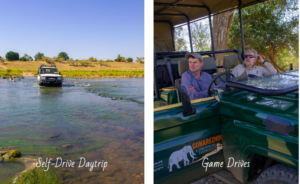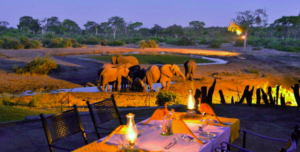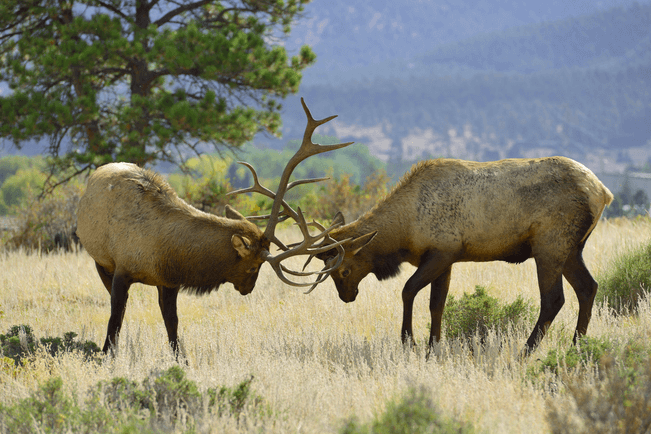
Elk hunting Canada.
Welcoming you to Canada’s untamed and rocky wilderness, where the hunt for beautiful elk takes center stage.
Elk hunting in Canada offers an unrivaled encounter for both seasoned hunters and amateurs wanting an adrenaline-fueled vacation, nestled amid beautiful vistas and huge stretches of unspoiled wilderness.
Join us as we explore the essence of this intriguing activity, learning the hunt’s secrets and identifying the special appeal that pulls hunters from all over the world to this exceptional hunting location.
How to hunt elk in Canada Full Guide.
In order to successfully hunt elk in Canada, one must be well-prepared, familiar with the area, and follow all applicable hunting laws. A general guide for hunting elk in Canada is provided below:
Research and license acquisition:
Learn about the hunting laws in the province in which you intend to go hunting. Verify the licensing requirements, costs, and any applicable limitations or quotas. Long before your hunting trip, get the required licenses, tags, and permits.
Select a Hunting Area:
Choose a hunting location with an abundance of elk and sufficient terrain. Take into account elements like accessibility, closeness to lodgings, and the presence of outfitters or guides, if needed. For advice, speak with regional wildlife organizations, seasoned hunters, or internet resources.
Scout the Area:
Scout the hunting region in advance of the hunting season to become familiar with the elk’s routines, feeding places, and movement patterns. Look for elk activity indicators like tracks, poop, and rubs to assist you locate possible hunting grounds.
Gear and Equipment:
Make sure you have the right tools and supplies for elk hunting. A dependable rifle or bow, suitable ammo or arrows, hunting gear (such as camouflage), boots, binoculars, a GPS unit, a hunting knife, and field-treatment materials are generally included. Additionally, be sure to include enough food, water, and other necessities for survival.
Create a hunting plan:
Spot-and-stalk, calling, or stand hunting tactics are all possible while hunting elk. Spot-and-stalk includes tracking down elk and approaching them on foot, whereas calling imitates their vocalizations to draw them in. Stand hunting entails waiting in a secret spot, such a tree stand or ground blind, close to well-known elk transit or feeding paths. Based on your hunting prowess, the environment, and the local elk’s habits, choose a plan.
Hunt Responsibly and Ethically:
Hunt morally by using clean, humane shots, according to game rules, and protecting the environment. Be mindful of the terrain and other dangers in the immediate area, and only fire within your effective range. For a safe and ethical hunt, whether you’re utilizing a guide or outfitter, heed their advice.
Safety Considerations:
Throughout your elk hunting trip, put safety first. Tell someone about your intended hunting locations and return time. Be mindful of your surroundings, particularly while negotiating difficult terrain or coming across other hunters. When field dressing or handling game, always use caution and observe firearm safety procedures.
Always keep in mind that elk hunting may be physically taxing and demands patience, skill, and tenacity. To increase your chances of having a fruitful and successful hunt, it is advised to seek advice from seasoned hunters, think about hiring an outfitter or guide, and continuously educate yourself on elk behavior and hunting strategies.
Elk hunting Locations In Canada.

Canada has several amazing places for elk hunting where you may chase these magnificent animals. Here are some significant areas whose elk populations and hunting prospects are well-known:
Alberta:
Alberta provides a wide variety of hunting habitat, from deep woods to broad grasslands, and is well-known for its immense wildness and high elk herds. The Rocky Mountains, Athabasca, and Peace River areas are well-liked destinations for elk hunting excursions.
British Columbia:
British Columbia offers an exhilarating elk hunting experience with its beautiful mountain ranges and many animal areas. The Kootenays, Cariboo, and Skeena offer a combination of difficult terrain and ideal elk habitats.
Saskatchewan:
Large elk populations may be found in Saskatchewan’s woods and meadows, drawing hunters looking for an exciting activity. Elk hunting chances may be found in places like the northern boreal woodlands and the southern Cypress Hills.
Manitoba:
Manitoba offers an exhilarating elk hunting experience with its combination of boreal woods and grassland landscapes. Hunters who want to test their prowess against elusive bull elk often travel to the Interlake and Parkland districts.
Yukon:
The Yukon’s untamed environment is a hunter’s paradise for anyone wanting a distant and difficult elk encounter. The MacMillan Pass and Pelly Mountains, among other magnificent scenery, offer a spectacular background for the hunt for trophy elk.
Newfoundland and Labrador:
Elk populations are prospering in Newfoundland and Labrador, which is known for its large forest areas. Elk hunting possibilities are particularly good in Newfoundland’s interior and on the Northern Peninsula.
Remember that elk hunting restrictions and seasons might vary by province, so it’s crucial to familiarize yourself with them before making travel arrangements. Consider working with local outfitters and guides as well, since they may offer specialist advice and support for a successful and ethical hunting experience.
Elk Hunting Seaons In Canada explained

Canada has regulated elk hunting seasons that vary by province and guarantee ethical and lawful hunting methods. The broad descriptions of the elk hunting seasons in several of the well-known Canadian provinces are as follows:
Alberta:
Generally speaking, the Alberta elk shooting season lasts from September to November, with different wildlife management units (WMUs) having different exact dates. Archery seasons may begin early, frequently in August, giving hunters an additional opportunity.
British Columbia:
The elk hunting season varies in British Columbia depending on the location and WMU. Rifle seasons typically last from September through November, although in certain places, archery seasons can begin as early as August and go through December.
Saskatchewan:
In Saskatchewan, the elk hunting season normally starts in September and lasts until November. There may be distinct seasons for archery, rifle, and muzzleloader hunting, with different deadlines and rules depending on the WMU.
Manitoba:
In Manitoba, the elk hunting season typically lasts from September to November, with particular dates varied per WMU. There are seasons for archery, muzzleloader, and rifles, giving hunters a variety of hunting options.
Yukon:
The Yukon’s elk shooting season normally lasts from August through October, however specific dates might vary. Due to the restricted number of hunting possibilities in the Yukon, it is crucial to review particular restrictions and get the required permits and licenses.
It’s important to remember that hunting restrictions and seasons may change from year to year. It is advised to visit the official websites of the relevant provincial wildlife agencies or to speak with local officials, outfitters, or hunting guides to guarantee compliance with the most recent information. Before going on an expedition for elk hunting in Canada, it’s also necessary to obtain the proper licenses and tags.
How To Obtain Elk Hunting Permit in Canada.
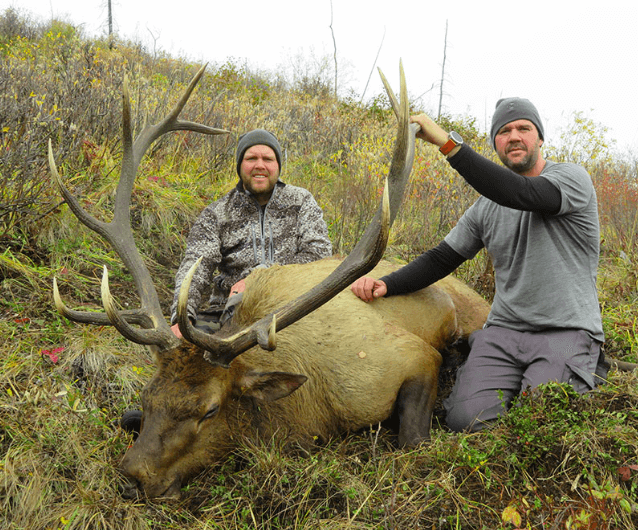
In order to receive an elk hunting licence in Canada, you must adhere to particular guidelines and specifications established by the relevant provincial wildlife organizations. Here is a broad summary of how to get an elk hunting licence in Canada, while the precise procedure may differ significantly between provinces:
Selecting a province:
Choose the Canadian province where you want to go elk hunting. Each province has its own set of laws and permitting procedures for managing animals. To comprehend the requirements and application procedure, research the province’s hunting rules.
Review the Regulations:
Review the province’s elk hunting laws and regulations to become familiar with them. Hunting seasons, bag limits, license costs, and any unique criteria or limitations are all covered by regulations.
Education and Licensing for Hunters:
In the majority of provinces, taking a hunter education course is a requirement before submitting an application for a hunting license or permit. These programs offer important information on ethical hunting practices and animal protection. Verify that you have finished the required training by looking up the province’s criteria for certification in hunter education.
Visit the website of the wildlife department or agency in the province where you intend to hunt elk to apply for a hunting license. Locate the special application form for elk hunting under the area devoted to hunting licenses and permits. Give all necessary information and complete the form as completely as possible.
Pay the Fees:
Elk hunting permits typically involve fees, which may vary depending on the province and the type of license (resident/non-resident, guided/unguided, etc.).
Ensure you understand the fee structure and make the required payment when submitting your application. Accepted payment methods can vary but usually include credit/debit cards or online payment systems.
Submit the Application:
Follow the instructions provided on the application form to submit your elk hunting permit application. This may involve mailing the application, submitting it online through a designated portal, or delivering it in person to the wildlife agency or authorized licensing office.
Wait for Processing:
After submitting your application, give the wildlife agency enough time to process it. It is important to apply far ahead of the hunting season because processing periods might vary. Follow up on the status of your application and make sure you have your elk hunting permit confirmation.
Validation of licenses and reporting:
Verify that your elk hunting permit is legal and compliant with the specifics of your hunting arrangements once your application has been granted and you have received it. To abide by the rules and support efforts to manage wildlife, get familiar with any reporting requirements, such as those involving required harvest reporting or check-ins.
Keep in mind that each province may have different procedures and criteria for getting an elk hunting licence.
How much is elk hunting permit in Canada?
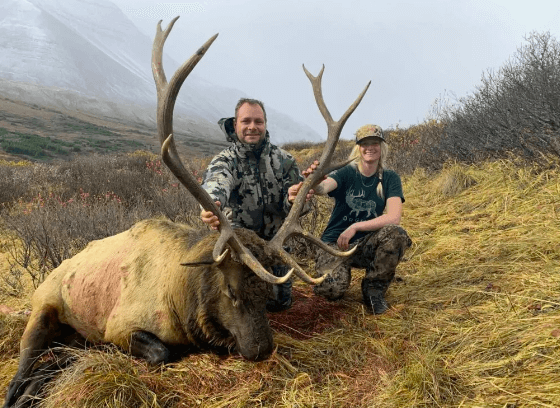
The cost of an elk hunting permit in Canada varies depending on the province, the type of license (resident or non-resident), and the specific hunting package or duration chosen. It’s important to note that the prices mentioned below are approximate figures and can change over time. Here is a general overview of the cost range for elk hunting permits in different Canadian provinces:
Alberta:
In Alberta, resident elk hunting permits can cost anywhere from $80 and $200, depending on the hunting package and zone.
An elk hunting license can cost anywhere from $250 to $700 for non-residents.
British Colombia
Residents of British Columbia normally pay $30 to $50 for an elk hunting license, while non-residents should budget between $250 and $400.
Saskatchewan:
Residents of Saskatchewan should expect to spend between $25 and $100 for an elk hunting license, compared to between $200 and $400 for non-residents.
Manitoba: Elk hunting permits typically cost $50 to $100 for citizens while they may expect to spend between $250 and $400 for non-residents.
Yukon:
Residents of the Yukon often pay $25 to $50 for elk hunting licenses, but non-residents may spend between $300 and $600.
Newfoundland and Labrador:
Residents of Newfoundland and Labrador must pay between $25 and $50 for an elk hunting license, while non-residents must shell out between $250 and $400.
Please note that these figures are provided as a general reference, and actual prices can vary. It’s essential to check the specific hunting regulations and licensing fees set by the respective provincial wildlife agencies for the most accurate and up-to-date information regarding elk hunting permit costs.
Canada elk hunting FAQs
Is a license required to hunt elk in Canada?
Yes, hunting elk in Canada requires a hunting license. Each province has its own set of criteria and licensing processes. Before engaging in elk hunting activities, hunters are required to secure the necessary licenses, tags, and permits.
When is Canada’s elk hunting season?
Canada’s elk hunting seasons are controlled to guarantee ethical hunting methods and vary by province. Elk hunting seasons typically last from September through November, however exact dates might change. For proper season information, it’s vital to refer to the hunting laws of the province where you intend to hunt.
Can foreigners go elk hunting in Canada?
Yes, elk hunting is frequently permitted in Canada for non-residents. However, non-residents frequently need to meet certain restrictions, such as getting a non-resident hunting license and shelling out more money for a license than do citizens. For non-resident hunters, each province establishes its own rules and fees.
Can I use a bow or a rifle to hunt elk?
Both archery and rifle hunting for elk are legal in the majority of Canadian provinces. Compared to rifle seasons, archery seasons may have various start dates and rules. Review the hunting laws of the province where you intend to hunt to learn the precise guidelines for hunting techniques.
Are there any limits on how many elk I am permitted to kill in Canada?
Yes, hunting laws frequently include restrictions on the quantity of elk a hunter may take. To promote the preservation and sustainable management of elk populations, bag limitations are put in place. Depending on the province, hunting area, and hunting technique, different bag limitations may apply.
Do I need a guide if I want to go elk hunting alone?
Depending on the province and your preferences, you can either hunt elk alone or with a guide. Non-resident hunters may need to be accompanied by a qualified guide or outfitter in several provinces. Even while it’s not required, using a guide can improve your hunting trip, give local knowledge, and raise your chances of
Similar post
- Montana Antelope Hunting Fully Explained: Unrivaled Hunting Experience.
- New Mexico Antelope Hunts: Available to both Residents and Non-Residents.
- Utah elk hunting: How and when To Hunt elk In Utah.
- Moose Hunting Colorado. When Is the hunting season and how do you hunt Moose?
- British Columbia Mountain Goat Hunt. All You Need To Know.



